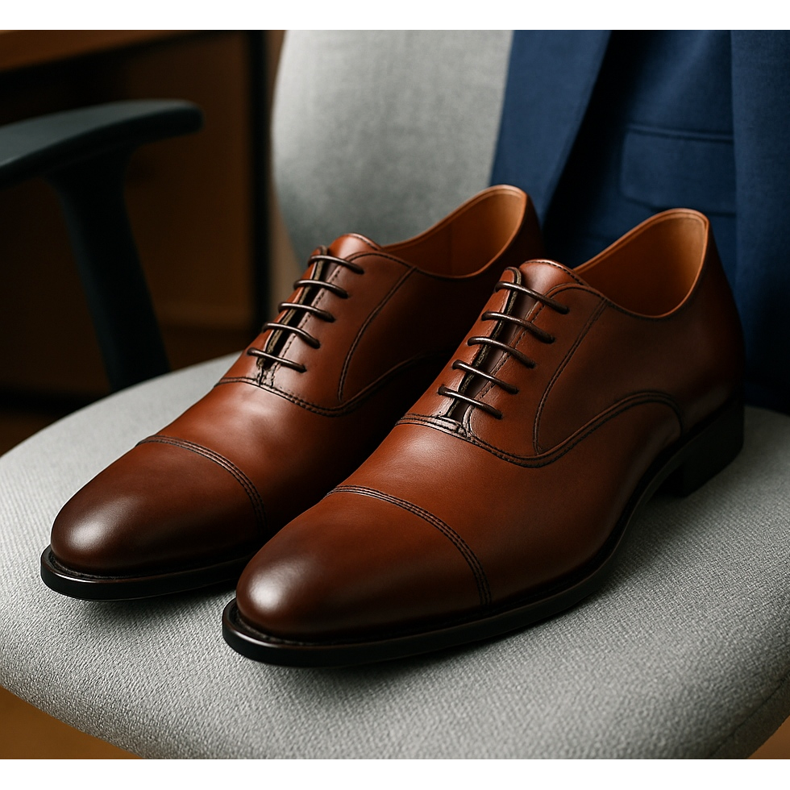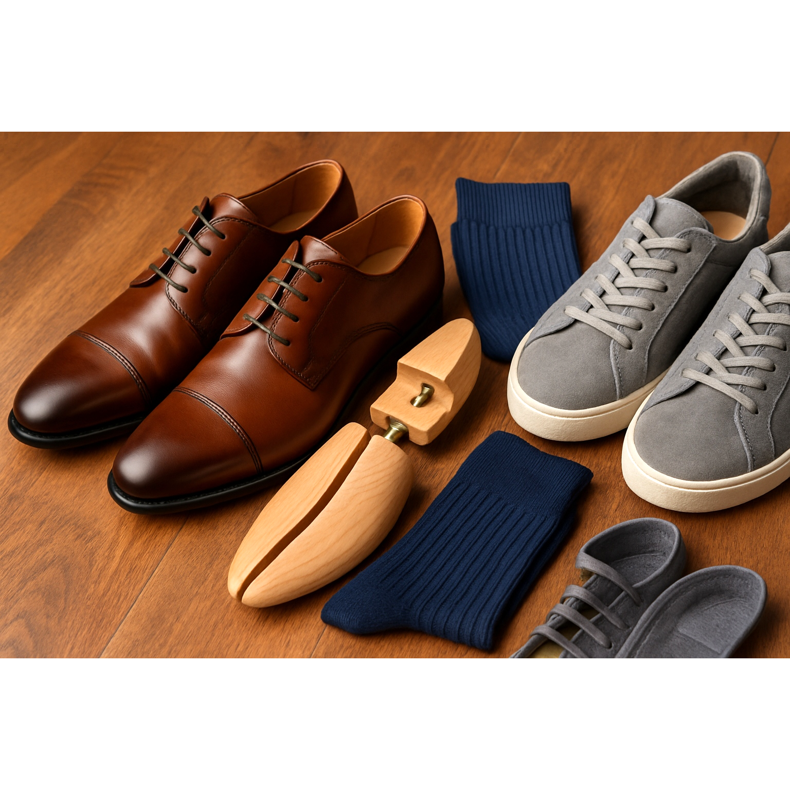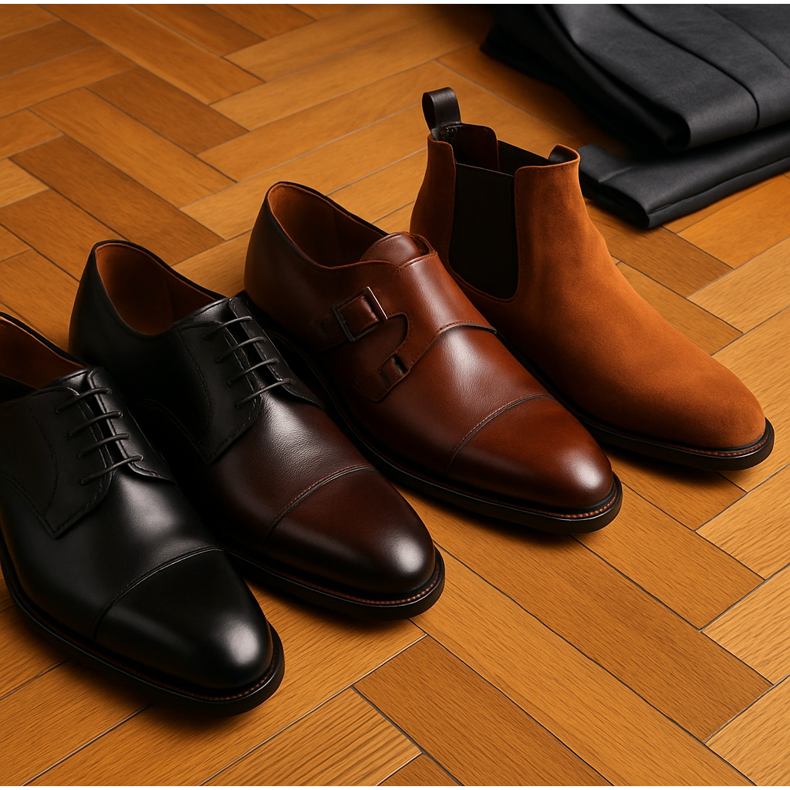
Men's shoes for working in the office - how to choose comfortable and elegant footwear
Working in an office requires not only professionalism, but also appropriate attire. Shoes play a key role in building a business image. Find out which models will work best in a corporate environment, how to ensure comfort throughout the working day and what mistakes to avoid when choosing office shoes.

Why is choosing office shoes so important?
You spend 8 hours a day or more at work - your shoes must be not only elegant, but above all comfortable. Poorly selected footwear can lead to foot pain, back pain and general discomfort that affects your productivity and well-being.
In an office environment, shoes are also an important element of your professional image. Neat, well-kept footwear signals attention to detail and professionalism. On the other hand, worn, dirty or inappropriate shoes may negatively affect the perception of you by your colleagues and superiors.
That's why it's worth spending time carefully choosing work shoes - a combination of style and comfort is the key to success in the office.

The best models of shoes for the office
Oxfords
It's a classic of elegance and a safe choice for any office dress code. Closed lacing and a smooth line make the Oxfords match perfectly with a suit. Choose models in black or dark brown - these are the most universal colors.
Derby
Slightly less formal than Oxfords, but still very elegant. Open lacing makes them more comfortable for wider feet. Derby shoes are perfect for business casual and smart casual environments.
Monk Strap
Shoes with a buckle instead of laces - an elegant alternative to traditional models. Single Monk (one buckle) is more formal, Double Monk (two buckles) adds character. Perfect for people who value originality within a professional style.
Moccasins
In less formal offices, loafers (penny loafers, tassel loafers) will be an excellent choice. Comfortable, elegant and easy to use. However, avoid models with too casual details in corporate environments.
Chelsea Boots
In the colder months, Chelsea boots are a stylish option. Smooth leather without decorative stitching, elastic inserts on the sides - they look elegant with suits and chinos.

What should you pay attention to when choosing office shoes?
Fit
This is the most important element. Shoes should not be too tight, but they should not be too loose either. There should be a space of about 1 cm between the toes and the toe of the shoe. Try on your shoes in the afternoon when your feet are a bit swollen - this will give you the most realistic fit.
Material
Natural leather is the best choice for the office. It breathes, adapts to the foot and gains character with age. Avoid synthetic materials - they do not provide adequate ventilation and may cause your feet to sweat excessively.
Sole
The leather sole looks elegant, but is less practical in wet weather. The rubber sole offers better grip and is more durable. A good compromise are shoes with a leather sole and a rubber toe and heel.
Insole and lining
Check the quality of the insole - it should be well-shaped and provide support for the arch of the foot. If you have orthopedic problems, consider purchasing shoes that you can insert your own orthopedic insoles into.
Construction
Goodyear Welted shoes are the most durable and can be resoled many times. Blake construction is lighter and more flexible. Avoid glued shoes - they are not suitable for long-term use.

All-day comfort - practical tips
Shoe rotation
Never wear the same shoes two days in a row. The shoes need 24 hours to dry and regain their shape. Having at least two to three pairs of office shoes will extend their life and increase comfort.
Use shoe trees
Tree trees (preferably wooden) absorb moisture, help shoes keep their shape and prevent creases. Always put them on after taking off your shoes.
Choose the right socks
Socks should be made of natural materials (cotton, wool, bamboo) and reach mid-calf. They prevent chafing and provide adequate ventilation.
Take care of your hygiene
Air your shoes regularly, use shoe deodorants and replace your insoles. This prevents unpleasant odors and fungal infections.
Prepare spare shoes
Keep a spare pair of comfortable shoes or dress sneakers in the office in case your main shoes get wet or pinch. This is especially useful on long working days.

The most common mistakes when choosing office shoes
Buying shoes that are too small
Many people buy shoes that are a size too small, hoping that they will stretch. This is a mistake - too tight shoes can lead to serious health problems.
Ignoring the dress code
Even the most comfortable sneakers will not be appropriate in a corporate formal environment. Get to know the rules applicable in your company and follow them.
Neglect of maintenance
Even the most expensive shoes will look cheap if they are dirty and worn out. Regular maintenance is essential.
Wearing the same shoes every day
This is the fastest way to destroy your shoes and cause foot discomfort.
Choosing style over comfort
Flashy shoes that cause pain are not a good investment. You spend too much time in the office to give up comfort.

How many pairs of shoes do you need for work?
At least that three pairs office shoes:
Pair 1: Black Oxfords or Derby shoes - for the most formal situations, meetings with clients, presentations.
Pair 2: Brown Derby or Monk Strap - For casual wear, team meetings, less formal days.
Pair 3: Loafers or Chelsea Boots - for variety, Fridays at the office, a more relaxed dress code.
Having three pairs allows for rotation and allows adequate recovery time for each pair. In the long run, it is also an economical solution - the shoes will last much longer.

Summary
Choosing the right shoes for the office is an investment in comfort, health and professional image. Choose quality, natural materials and classic models that will survive changing trends.
Remember to rotate your shoes, perform regular maintenance and match your company's dress code. Well-selected office shoes are the foundation of successful styling and your everyday comfort at work.
Don't skimp on shoes - they are one of the most important parts of men's wardrobe, which have a direct impact on your well-being and professional image.